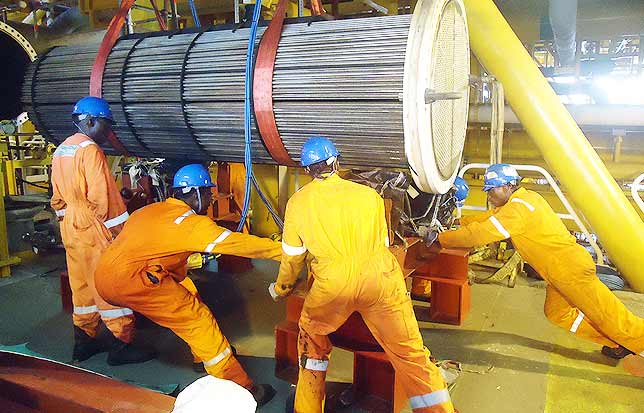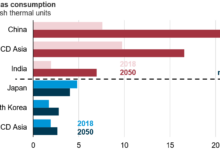
10 Problems and Challenges of Petroleum Industry Act Implementation in Nigeria
On August 16, 2021, the President of the Federal Republic of Nigeria, Muhammadu Buhari, signed into law a new Petroleum Industry Act 2021. Research showed that the bill for the Act had been lying in the chambers for the past twenty years.Information Guide Nigeria
History also has it that Nigerian lawmakers presented the same bill to President Olusegun Obasanjo at his time. At that time, the President seeing the numerous problems behind the bill refused to assent to it.
👉 Relocate to Canada Today!
Live, Study and Work in Canada. No Payment is Required! Hurry Now click here to Apply >> Immigrate to CanadaComing to 2021, the present lawmakers decided to pass the bill. The present head of state, seeing nothing wrong with it, decided to assent to it. Having signed it into law, what now remains is its implementation.
Now, are there some problems and challenges in implementing the Petroleum Industry Act in Nigeria? A critical review of the law reveals that there are some serious problems and challenges in the implementation of this law now in Nigeria.
Read Also: Multiple Taxations in Nigeria; problems, causes, effects, possible solutions
Some Problems and Challenges of the Petroleum Industry Act
Some of the problems and challenges of the 2021 Petroleum Industry Act in Nigeria include the following:
-
The Problem of Effective Implementation of the Act
The problem in Nigeria is not laws. The problem is the effective implementation of the laws. If the 2021 Petroleum Industry Act is properly implemented, it can become a good standard for the Petroleum Industry.
The law naming the Nigerian Upstream Petroleum Regulatory Commission (NUPRC) to govern and regulate oil and gas activities upstream is a welcomed development. In the same vein, the Nigerian Midstream and Downstream Petroleum Regulatory Authority (NMDPRA) will now be responsible for petroleum operations in the midstream and downstream.
Thus, the law overhauls the governance and the proper regulation of the petroleum industry in Nigeria. The challenge here is how these bodies will manage their sectors. How will they be able to tackle the problems the law has now posed in their various sectors?
-
The Creation of New Problems
The Petroleum Industry Act 2021, in an attempt to solve the old problems of the petroleum industry, created new serious ones. The law has created a clear dichotomy between the northern lawmakers and the southern lawmakers. Thus, the law has only succeeded in dividing Nigeria into two segments.JAMB Result
👉 Relocate to Canada Today!
Live, Study and Work in Canada. No Payment is Required! Hurry Now click here to Apply >> Immigrate to CanadaTo the southern lawmakers, the law is twisted to favour the northern part of the country. The southern lawmakers now see the northern lawmakers as cheating them.
Furthermore, the host communities who demanded 10%, which the lawmakers turned down, are not happy. On the other hand, the Pan Niger Delta Forum (PANDEF) is calling for the immediate reversal of the 3% the lawmakers have granted to the host communities. The law must address these new problems before it will see the light of the day.
Read Also: 10 Effects of Secession Agitation in Nigeria
-
Looking Backward Instead of Forwarding
The passage of this law reveals that Nigerian lawmakers and the executive are not foreseeing what the whole world is seeing. Now that the whole world is crying about climate change, many countries are drifting away from petroleum exploration.How to Transfer Airtel Airtime to another SIM with Easy Steps
If the federal government were to look forward, it would have seen that what Nigeria needs now is science and technology innovation. Nigeria now needs to develop other energy sources. Climate change will not allow Nigeria to pursue its oil exploration vision. This is a backwards-looking vision.
-
Unmerited Favour of the North
If you put little sand in a blind man’s soup, he will overlook it. However, if you pack sand into the soup, he will react, feeling that you insulted him because you know him to be a blind man. The federal government grants 30% fund for Frontier Basin Oil Exploration is granting the north a favour they do not merit.
The truth is that God did not deposit petroleum all over the earth. The same thing goes for gold. We do not find gold in all places. In Nigeria, oil and gas are special blessings to the south, especially in the Niger Delta Basin. This is God’s doing. No man can take it away.JAMB Form
The problem now is that man is turning the blessing into a curse. The federal government is denying them the benefit of the blessing. It is trying to transfer the blessing to those who do not merit it. This is unfair!
-
The Opening of an Old Wound
In the history of Nigeria, the Ogonis have been crying over the degradation about their land. They complain of the pollution of their rivers and ponds. When the federal government refused to listen to them, they resorted to militancy and the kidnapping of oil workers on their land.WAEC Result
When the federal government saw what was going on, it decided to rehabilitate them. It sent them for training and decided to be paying them. They then laid down their arms and stopped their militancy and kidnapping.
Now that the Pan Niger Delta Forum and the host communities are angry with the present federal government, only God knows what they will resort to. The law is bound to remind them of what they had left.
Read Also: 10 Effects of Erosion on Agriculture in Nigeria
-
Increment in Secession Agitations
One problem that Nigeria has been trying to solve for more than a decade now is secession agitations. One of the things that have made some of the regions’ clamour for secession is resource control. They feel cheated. They feel their resources are being used to develop other regions.
The Petroleum Industry Act has sounded it loud and clear that the resources of the southern region are being used to develop the northern region. While the producers of oil and gases are being given 3%, non- producers are getting 30%. Imagine the difference. If the host communities had been given the 10% they demanded, it would have been a different thing altogether.Npower Recruitment
The people in the region where oil is being produced will now want to have a rethink. The next thing would be the thought of becoming autonomous. They would rather want to have everything for themselves.
Already, the southern governors and the southern lawmakers are not happy. Nobody from the south is happy. It is true that the law cannot please everybody. Yet, fair play is golden.How to Check MTN Tariff Plan
It is ironic to say that those whose lands pipelines pass through are automatic oil producers. These people are entitled to the same percentage that the host communities where the oil is being drilled have. These things are provoking.
-
General Hardship to Nigerians
The federal government signed the Petroleum Industry Act into law in August 2021. By March 2022, it increased the pump price of fuel. Everybody started crying. Prices of all things went up. Government workers started crying. Non-government workers equally did the same thing. The farmers were not left out. All as sundry were affected.Problems and Challenges of Petroleum Industry Act Implementation
See people are turning God’s blessings into a curse. Nigeria as an oil- producing country ought to be one of the richest countries in the world. Nevertheless, the reverse is the case. It borrows money from other countries to solve its problems. Something must be wrong somewhere. God hates injustice. He does not like to hear the cry of the poor. He likes fighting for them. We shall be free one day.
Read Also: The Problems of Oil Theft and Illegal Bunkering in Nigeria
-
The Problem of Double Taxation
The Petroleum Industry Act has Hydrocarbon Tax that the oil companies are to pay. Meanwhile, there is also the Company Income Tax that the same companies are to pay. The companies will interpret these taxes as double taxation. Such interpretation would discourage them from investing in Nigerian oil.
-
Unconducive Oil and Gas Operations Environment
Mike Sangster, a representative of the oil companies operating in Nigeria, saw the Petroleum Industry Act as creating an “Unfavourable environment for future deep-water investments and launching of new projects.” This is discouraging. If the petroleum Industry Act has created an unconducive environment for oil operations, will the companies continue to operate in such Nigerian oil and gas environment?
Therefore, you can see that the Act has more problems than it intended to solve. Definitely, the angered host communities may not allow the oil companies to operate freely in their communities.
With petroleum being discovered in other West African countries, the problem that the Act poses in the Nigerian petroleum industry, the Nigerian oil and gas industry may suffer a decline. This will make the realization of the Petroleum Industry Act objectives a mirage.
Read Also: 10 Problems Challenges Facing INEC in Nigeria
-
The Problem of Frontier Basin Exploration
The definition that the Petroleum Industry Act has given to Frontier Basin Exploration is insufficient. This has made the southerners interpret it as a mere way of trying to transfer oil resources to the northern part of the country where petroleum deposit does not exist.
Petroleum cannot be manufactured. If it is not there, it is not there. Even if petroleum exists in the north, its topography is such that does not favour oil and gas exploration. Therefore, voting some funds for the exploration of some frontier basins is a mere waste of funds. The objective may not be met.
Conclusion
In conclusion, we may be right to say that the Nigerian Petroleum Industry Act created new problems while trying to solve old ones.
Check and Confirm: How much is Dollar to Naira Today Pounds to Naira Today






